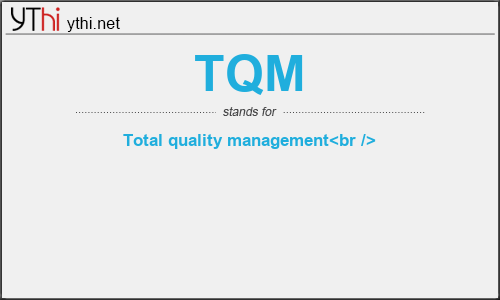What does TQM mean? What is the full form of TQM?
The Full Form of TQM is Total quality management
Total quality management (TQM) is the continual process of detecting and reducing or eliminating errors in manufacturing, streamlining supply chain management, improving the customer experience, and ensuring that employees are up to speed with training. Total quality management aims to hold all parties invo
lved in the production process accountable for the overall quality of the final product or service.
TQM was developed by William Deming, a management consultant whose work had a great impact on Japanese manufacturing.1 While TQM shares much in common with the Six Sigma improvement process, it is not the same as Six Sigma. TQM focuses on ensuring that internal guidelines and process standards reduce errors, while Six Sigma looks to reduce defects.
KEY TAKEAWAYS
- Total quality management (TQM) is an ongoing process of detecting and reducing or eliminating errors.
- It is used to streamline supply chain management, improve customer service, and ensure that employees are trained.
- The focus is to improve the quality of an organization’s outputs, including goods and services, through continual improvement of internal practices.
- Total quality management aims to hold all parties involved in the production process accountable for the overall quality of the final product or service.
Total quality management (TQM) is a structured approach to overall organizational management. The focus of the process is to improve the quality of an organization’s outputs, including goods and services, through continual improvement of internal practices. The standards set as part of the TQM approach can reflect both internal priorities and any industry standards currently in place.
Industry standards can be defined at multiple levels and may include adherence to various laws and regulations governing the operation of the particular business. Industry standards can also include the production of items to an understood norm, even if the norm is not backed by official regulations.
TQM
means
Total quality management![]()
Translate Total quality management
to other language.
,
' on your site.


Leave a Reply
You must be logged in to post a comment.